Members
ITC members include innovation and translation-focused stakeholders from the School’s departments, offices, and the broader university community.
ITC Members
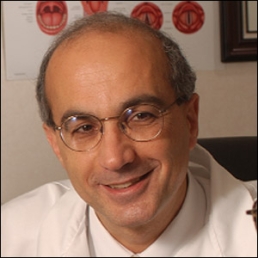
Alan H. Shikani, MD, FACS
Dr. Alan H. Shikani, MD, FACS, is a board-certified otolaryngologist and fellowship-trained surgeon who completed his residency and fellowship at the Johns Hopkins Department of Otolaryngology–Head and Neck Surgery.
Deeply committed to research and innovation, Dr. Shikani has authored more than 80 scientific publications numerous book chapters and a book on airway management, and holds over two dozen U.S. and international patents. His work has led to the development of groundbreaking medical devices, including instruments for difficult airway management, novel sinus surgery tools, and the Shikani speaking valve, which has restored voice and improved quality of life for countless tracheotomy patients. He is also the founder and CEO of The Airway Company, which designs and manufactures devices to improve speech and pulmonary health in patients with tracheostomies.
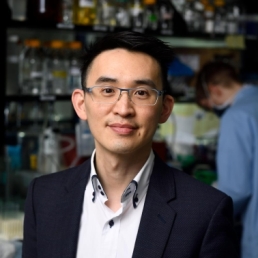
Anthony K. L. Leung, PhD, MBioch
Scientist and inventor Anthony Leung is an expert in the area of RNA, ADP-ribosylation, and proteomics. Leung started his lab in 2011 as an assistant professor and is currently a tenured professor in Biochemistry and Molecular Biology at Johns Hopkins University. Funded by the Idea Award from the Department of Defense Breast Cancer Research Program, Leung developed a novel non-biased technique to identify the sites of ADP-ribosylation, which is a technical breakthrough in the field. He has since been recognized with numerous accolades: Top 5 Agilent Early Career Professor (2013), the Inaugural Johns Hopkins Catalyst Award (2015), Research Scholar Award from the American Cancer Society (2016), and Top 10 Finalist for the American Society of Cell Biology–Gibco Emerging Leader Prize (2016). He has authored over 40 peer-reviewed publications, has been invited to write book chapters, and has reviewed articles.

Anthony D. So, MD, MPA
Anthony D. So, MD, MPA, is distinguished professor of the practice and founding director of the Innovation+Design Enabling Access (IDEA) Initiative. Based in Health Systems in the Department of International Health, the IDEA Initiative fosters innovation and the design of systems that better enable access and impact of health technologies, particularly for those in need due to disease and disadvantage. So served as co-convener of the UN Interagency Coordination Group on Antimicrobial Resistance, delivering its recommendations to the UN Secretary-General in 2019, and was a member of the Expert Advisory Group for the UN Secretary-General’s High-Level Panel on Access to Medicines. He co-chaired a technical working group for the 2021 WHO Fair Pricing Forum, served on the Technical Advisory Group of WHO’s COVID-19 Technology Access Pool, and currently is part of the WHO’s Market Access to Vaccines Technical Advisory Group. He was part of the Chatham House Working Group on New Business Models for Antibiotics and was a member of the Institute of Medicine’s Committee on Accelerating Rare Disease Research and Orphan Product Development. So also chairs the School’s Graduate Medical Education Committee, supporting its medical residency programs in occupational and environmental medicine and general preventive medicine.

Bonnie Koo
Bonnie Koo is an MPH/MBA candidate at the Johns Hopkins Bloomberg School of Public Health and Carey Business School. She has over 13 years of experience across digital health, pharmaceuticals, and hospital systems, with a clinical background as a surgical and intensive care pharmacist in the United Kingdom. Her work includes business development in the pharmaceutical industry and commercialization of a digital biomarker health tech startup in the United States. At Johns Hopkins, she mentors early-stage ventures through the Fuel Accelerator at the Pava Center for Entrepreneurship. Her interests focus on translating healthcare innovation into scalable, real-world solutions by bridging clinical insight with commercial strategy.

Brian Crawford, PhD
Brian D. Crawford, PhD ’82, is a strategy consultant and advisor with expertise in the biomedical and biochemical sciences, serving clients within the global scientific, technical, and medical (STM) publishing industry. He is a non-executive director of the British Medical Journal Publishing Group, as well as a member of the board of directors and chair of the audit committee with the Copyright Clearance Center. He has been active in publishing trade associations, including the board of directors of the Association of American Publishers, as well as the executive committee of the International STM Association. He was also appointed to volunteer positions on the American Medical Association’s Journal Oversight Committee for JAMA and the JAMA Network, as well as the Scientific Publishing Committee of the American Heart Association. Brian began his publishing career within the Journals Publishing Division of Academic Press, Inc., where he first gained recognition for partnering with the distinguished human geneticist Victor McKusick, MD, of Johns Hopkins Medicine on the conception, development, and initial publication in 1987 of Genomics, the first peer-reviewed journal devoted to the eponymous field of scientific study that emerged in parallel with that publication.
Prior to entering scientific publishing, Crawford was the first biologist to be appointed as a J. Robert Oppenheimer Fellow of the Los Alamos National Laboratory, where he was a member of the scientific research staff within the Genetics Group of the Life Sciences Division, and joined in early DOE-sponsored efforts that led to the international initiative to map and sequence the human genome. Crawford completed his doctoral studies in the biochemical and biophysical sciences at the Johns Hopkins University School of Public Health in 1982, where he specialized in cellular and molecular aspects of cancer genetics under sponsorship from the National Cancer Institute, having received earlier his bachelor's of science cum laude with High Honors in Chemistry from the University of Maryland at College Park.

Brittany Jenkins-Lord, PhD, MPH ’20, MS
Brittany Jenkins-Lord, PhD, MPH ’20, MS, is a molecular cancer biologist investigating connections between socio-environmental factors, tumor biology, and treatment resistance in diverse populations.The Jenkins-Lord Laboratory investigates how social and environmental risk factors contribute to breast cancer etiology and tumor biology, with a focus on understanding the molecular mechanisms underlying aggressive subtypes. Its research explores therapeutic strategies to overcome treatment resistance in both ER-positive and ER-negative breast cancers and examines how social determinants of health influence cancer biology and survivorship. By integrating genetic, epigenetic, and socio-environmental data, the lab aims to uncover drivers of cancer development and progression to ultimately improve outcomes for all patients.

Caleb Alexander, MD, MS
Caleb Alexander, MD, MS, is a professor of Epidemiology at the Bloomberg School of Public Health and of Medicine at the Johns Hopkins School of Medicine. He also serves as founding co-director of the Center for Drug Safety and Effectiveness and principal investigator of the Johns Hopkins-FDA Center of Excellence in Regulatory Science and Innovation (JH-CERSI). He is a practicing general internist and pharmacoepidemiologist and is internationally recognized for his research examining prescription drug utilization, safety, and effectiveness. The author of over 375 scientific articles and book chapters—many of which have focused on the epidemiology of the opioid epidemic—he has published regularly in leading scientific journals and testified in front of expert bodies, including the U.S. House of Representatives and U.S. Senate. Alexander also serves on several editorial and advisory boards and is a frequent speaker on pharmaceutical utilization and policy. He received his B.A. cum laude from the University of Pennsylvania, an MD from Case Western Reserve University, and a Master of Science from the University of Chicago.

Caroline Popper, MD, MPH
Caroline Popper, MD, MPH, is the founder and president of Popper and Company, a boutique health care and life sciences consulting firm with clients across North America, Europe, Africa, and Asia. Her firm, built by individuals with highly complementary expertise in medicine, engineering, information technology, molecular biology, health care services and health economics—gained inside and outside health care—serves Fortune 500 and venture-backed companies and advises institutional and private investors.
A Hopkins-trained internist and pathologist, she combines this perspective with that gained from managing a wide spectrum of public and private businesses in diagnostics, medical devices and drug discovery. She has a deep interest in the application of AI and data science in health care, and in the intersection between health care and law.

Colleen Cutcliffe, PhD
Colleen Cutcliffe, PhD ’03, is the co-founder and CEO of Pendulum Therapeutics, a biotech company pioneering the next frontier of microbiome science. Leading a team of scientists with deep microbiology, biochemistry, computational and clinical expertise, Cutcliffe is developing revolutionary, safe, and effective products that address imbalances in the microbiome, transforming people’s health. Armed with 18 patents and 66 pending, Pendulum has raised $150 million to date from Mayo Clinic, Sequoia Capital, Meritech Capital, True Ventures, Khosla Ventures. In 2023, Cutcliffe brought on Halle Berry, Academy Award® winning actress and director, as an investor and Chief Communications Officer of the company. Founded in 2012, Pendulum Therapeutics is headquartered in San Francisco.
Prior to starting Pendulum, Cutcliffe held senior positions at bioscience and pharmaceutical firms. Cutcliffe completed her postdoctoral studies at Northwestern’s Children’s Memorial Hospital. Cutcliffe received her PhD in Biochemistry and Molecular Biology from the Bloomberg School and her BA from Wellesley College.

David Hickey
Dave Hickey is a dynamic, deliberate global leader with more than 30 years of experience in the field of medical technology, during which time he has developed a fine-tuned financial acumen, while maintaining a fervent focus on quality. He is a lifelong learner, consummate communicator, and adept problem-solver who elicits commercial and operational excellence from his teams.
Hickey served as executive vice president and president of the Life Sciences segment of Becton, Dickinson and Company, a leading global medical technology company headquartered in Franklin Lakes, New Jersey. In this role, he oversaw strategy development, global operational, commercial and financial performance of the businesses that comprise the Life Sciences segment (BioSciences, Specimen Management and Diagnostic Solutions) and which spans the continuum of discovery, translation, diagnostics and therapy selection. He also led the Latin America region for the company and is a member of the BD Executive Leadership Team.

Gregory Kirk, MD, MPH, PhD
Greg Kirk serves as the vice dean for research at the Bloomberg School of Public Health.
Kirk received his undergraduate degree from Oklahoma State University, a PhD and MPH from the Johns Hopkins Bloomberg School of Public Health, and an MD from the University of Oklahoma Health Sciences Center College of Medicine. He completed a residency in preventative medicine at the Johns Hopkins Bloomberg School of Public Health and in internal medicine at Georgetown University. He performed a fellowship in infectious diseases at the National Institute of Allergy and Infectious Diseases.
His research focuses on understanding and preventing the long-term consequences of chronic HIV infection, particularly the malignant complications of HIV and viral hepatitis. He has extensive research and clinical experience in Africa, leading the Gambia Liver Cancer Study, one of the largest studies of hepatocellular carcinoma (HCC) performed in the continent, in addition to years of collaborative research in Uganda.
Kirk has strong, multidisciplinary team leadership skills as principal investigator of the ALIVE cohort and several other collaborative studies in Baltimore. On the ITC, he brings a public health research-focused lens to the innovation discussions.
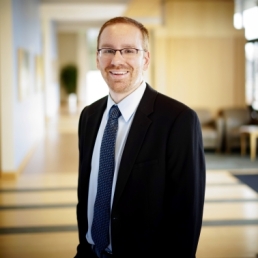
Jeffrey Hardesty, MPH ’15
Jeffrey Hardesty, MPH ’15, is an assistant scientist in Health, Behavior, and Society. He received his Master of Public Health degree with a concentration in Epidemiology and Biostatistics from the Johns Hopkins Bloomberg School of Public Health. His work at the Institute for Global Tobacco Control focuses on the potential benefits and unintended consequences of domestic and international e-cigarette and tobacco policies. His current projects include the Vaping and Patterns of E-cigarette use Research Study (VAPER Study)—a prospective cohort study of e-cigarette users in the U.S. He has authored state-of-the-evidence reports on raising the minimum age of purchase of tobacco products from 18 to 21, and banning or restricting flavored tobacco products. His past work focused on pictorial health warning labels in China and Indonesia.

Johannes Thrul, PhD, MS
Johannes Thrul, PhD, MS, focuses on mobile health (mHealth) research to study substance use, mental health, and digital well-being. He also uses technology, including smartphones and social media, to develop, test, and deliver interventions to prevent and treat substance use and mental health disorders.
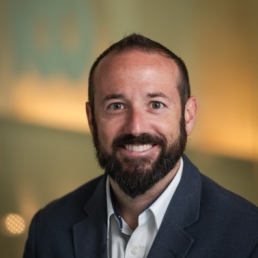
John Muschelli, PhD, ScM
John Muschelli, PhD, ScM, studies how biostatistics and data science can use neuroimaging and accelerometry data to improve clinical practice. As part of the ITC, Muschelli aims to uplift Bloomberg School investigators’ work so that it gains recognition and looks for opportunities to commercialize and translate research to the industry whenever possible. Muschelli sees opportunities for faculty to create products or services from recent shifts in algorithmic work and seeks to facilitate this process. Muschelli’s cross-department work on the Faculty Senate, his brief stint in a startup, and previous applications with Tech Transfer will help him support others to progress in the industry.
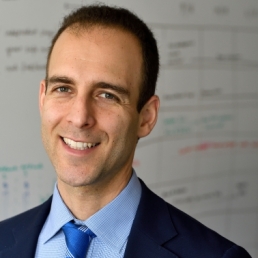
Johnathon Ehsani, PhD, MPH
Johnathon Ehsani, PhD, MPH, uses policy and behavioral research to prevent motor vehicle crashes and advance the health-promoting aspects of transportation. Using experimental, observational, and population-based methods, his research is focused on identifying policies that advance the safety and equity of the transportation system. Examples of his work include the effectiveness of licensing systems for teen drivers and distracted driving policies, naturalistic driving studies that examine individual-level driver behavior, and the impact of new mobility products and services (including bike-share, e-scooters, and autonomous shuttles) on cities. He currently serves on the Academic Advisory Council of PAVE (Partners for Automated Vehicle Education).
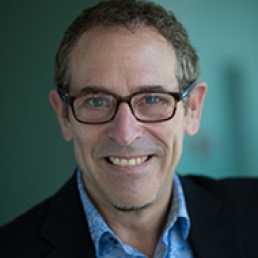
Karl Ronn
Karl Ronn is founder and CEO of First Mile Care, a Silicon Valley-based preventative chronic care company developing affordable, scalable, and sustainable solutions to reverse health conditions associated with obesity and diabetes.
First Mile Care was spun out of Health 2047, the Silicon Valley venture studio which was started by the American Medical Association to help transform health care. Karl works with entrepreneurs and advises Health 2047 on venture investments and sits on the boards of multiple startups.
He is also an active advisor to CEOs and top management at Fortune 500 companies helping to create billion-dollar growth engines.
During his 30-year tenure in management at consumer powerhouse Procter & Gamble, Karl was vice president of R&D and general manager of New Business/Health Care. In that position, he oversaw global R&D for pharmaceuticals and over-the-counter health care and was responsible for developing the company’s capability to create disruptive innovations. Karl created entirely new brands that are globally revered, including Swiffer, Febreze, and Mr. Clean Magic Eraser. As a result of his strategic insights and understanding of consumer behavior, the new categories rapidly grew to $1 billion in annual sales.
His book on turning disruption into business through partnerships, “The Reciprocity Advantage,” has received accolades from CEOs and academics alike.
Ronn is married to Elizabeth Ronn, a retired P&G marketing vice-president. They have two children and reside in Palo Alto, California.

Mei-Li Hey
Mei-Li Hey, MEng, is a first-year doctoral student in Environmental Health and Engineering. Advised by Carsten Prasse, PhD, MSc, she is in the Environmental, Sustainability, Resilience, and Health track. She earned a Master of Engineering degree from the University of California, Los Angeles, and has spent the past six years in the aerospace sector working as a mechanical design engineer on the James Webb Space Telescope. In 2020, she founded Atwero, a nonprofit that stemmed from research on access to improved sanitation facilities in Sub-Saharan Africa conducted while earning her undergraduate degree. Atwero designs and manufactures pit latrine assistive devices for persons with disabilities and operates out of Uganda.
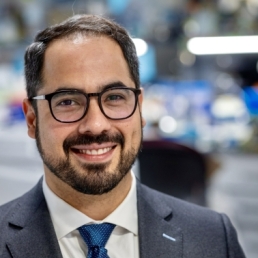
Radamés J.B. Cordero, PhD, MS
Radamés J.B. Cordero, PhD, MS, is a research professor and the Gilbert Otto Endowed Professor for Innovation and Entrepreneurship. His research explores how fungi adapt and survive in extreme environments—including outer space—a field known as astromycology, with active collaborations with NASA and the Department of Defense. Cordero is also the founder of MelaTech, a biotechnology company developing melanin-based materials for diverse applications. He has authored over 70 peer-reviewed publications and is the inventor of three approved patents. Committed to translational science, Cordero trains students to conduct rigorous research with purpose—developing discoveries that leave the lab and solve real-world problems today.

Sara C. Woodward
Sara Woodward has been working in Johns Hopkins University development for nine years and is currently the development manager in the Department of International Health. In her role, she has implemented a new development program and has been working to grow a long-term sustainable funding strategy around department priorities using a combined human-centered design and development donor process approach. Her areas of expertise include creating and managing pipelines, increasing engagement and stewardship opportunities with funders, developing new funding opportunities and giving mechanisms, working with communications to create content through a donor lens, and facilitating increased giving through relationship building with donors, partners, faculty, staff, and students. Sara is an alumna of The Peabody Conservatory at Johns Hopkins University, where she earned dual master's degrees in Opera and Historic Performance Practice. She has worked for 20+ years as a classical singer specializing in music written before 1750.
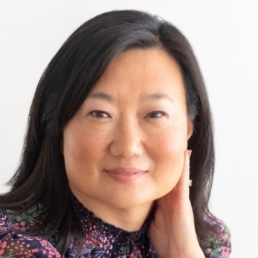
Suga Savage Smith
Suga Savage Smith has worked in the big tech/business development industry for over 20 years. In her prior roles, she has led technical, solutions-focused, client-facing teams to serve Fortune 50 organizations in realizing business outcomes through the adoption of cybersecurity, infrastructure, and cloud-based business solutions. She recently joined Johns Hopkins from Villanova University and currently serves as the director of Corporate Relations for the Bloomberg School of Public Health. Suga has a BS in Mathematics from Tufts University and resides in Radnor, Pennsylvania.

Thomas Hartung, MD, PhD
Thomas Hartung, MD, PhD, has a background in clinical and experimental pharmacology and toxicology, which has been documented in more than 730 publications. Previous work centers on the immune recognition of bacteria, including pyrogen testing and the induced inflammatory response. In experimental and clinical approaches, he studied the pharmacological modulation of these responses. Besides his directorship for the Center for Alternatives to Animal Testing (CAAT), Hartung established a laboratory for developmental neurotoxicity research based on genomics and metabolomics, developed standardized Brain Organoids and the Organoid Intelligence (OI) initiative. and the respective technologies were made available by a Thought-Leader Award from Agilent. He initiated the Evidence-based Toxicology Collaboration, the Microphysiological Systems World Summit series, the Green Toxicology program and most recently an ToxAIcology program as well as the Human Exposome Moonshot initiative. Hartung has led a technology transfer center (STZ InPuT) at the University of Konstanz, Germany, which managed 108 contracts with companies in eight countries in six years. He founded Organome LLC as a spin-off out of JHU, which merged into AxoSim, New Orleans, where he serves as Consulting VP of Scientific Affairs. He consults a number of biotech, CRO and pharmaceutical companies. He is the founder and co-owner of two not-for-profit LLCs: CAATevents and the Institute for Evidence-based Toxicology in Germany.
